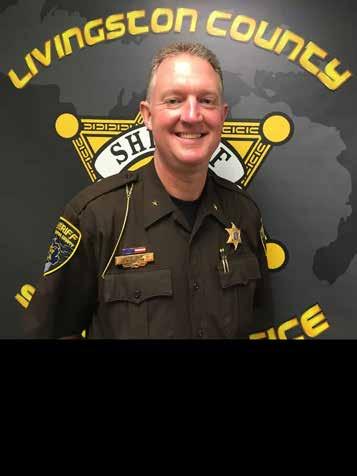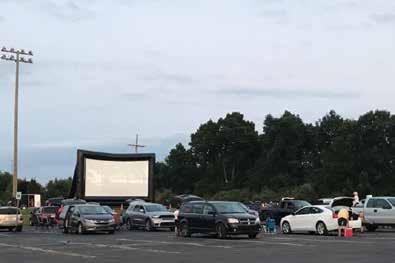
17 minute read
How to Prevent Becoming a Snowplow Parent
how to prevent becoming a
SNOWPLOW PARENT
By DR. TIM ELMORE
how to prevent becoming a
SNOWPLOW PARENT

On my drive to work each day, I pass by several bus stops where children wait to be picked up. They are not alone. Parents are there, too. Lots of them. Once I stopped to count the number of adults waiting with several 8- to 11-year-old students. There were more parents waiting at the bus stop than students.
Ialso drive on crowded roads where the number of cars doubles when school is in session. Why? Moms and dads drive their kids to school, or they purchase a car for their kids to drive themselves. It’s now the norm in many school districts.
This is a picture of a new normal.
THE PROS AND CONS OF TODAY’S PARENTING STYLE
I have mixed emotions about all of this. On the one hand, I love the fact that parents today want to be present with their children. These intentional parents spend time and money on tutors, travel sports teams, and other activities that give their children an advantage in life. For example, parents now spend more money raising their children than any previous generation did, according to Consumer Expenditure Survey data analyzed by the sociologists Sabino Kornrich and Frank Furstenberg. Furthermore, “according to time-use data analyzed by Melissa A. Milkie, a sociologist at the University of Toronto, today’s working mothers spend as much time doing hands-on activities with their children as stay-at-home mothers did in the 1970s.”
Whether it’s out of fear for their safety or to bolster their self-esteem, moms and dads now find time to lobby for their children’s success. One teen identified her mom as her “agent.” These parents are more than “helicopters” who hover over their kids. They’ve gone from monitoring kid’s lives to manipulating them. They are downright intrusive, all in name
continued on page 9
teens
fall 2020 @ cromaine
SUPPORTING | CARING | ENGAGING | EMPOWERING




LIVINGSTON COUNTY YOUTH
The Teen Room: Cromaine’s Teen Blog
It’s a social media platform just for Hartland’s teens! Check out interactive videos, illuminating blog posts, and amazing extras made by your peers. Visit cromaineteenroom. blogspot.com.
Overdrive
Use your library card to access ebooks and audiobooks.
Mobile Hotspots
Checkout a mobile hotspot from Cromaine for wifi on the go! When Cromaine is closed, wireless in the parking lot and virtual library services at WWW.CROMAINE.ORG are all available. Cromaine now offers HelpNow by BrainFuse, an all-ages tutoring resource. The live tutoring service is available from 2:00 to 11:00 pm EST (except holidays). HelpNow is designed to be used on a computer with a web browser. No other software is necessary. Log in by clicking the Brainfuse HelpNow link on WWW.CROMAINE.ORG and enter your library card barcode. From there, patrons can set up their own private free account with a username and password so they can connect with a live tutor, use study tools, and more!
WWW.CROMAINE.ORG 810-632-5200

LOOKING FOR VOLUNTEER OPPORTUNITIES?

www.volunteerlivingston.org
of their child’s progress and success. Even parents with college-age children: • Have been known to bring their children home because they didn’t like their roommates • Are known to pay sororities/fraternities to improve their children’s applications. • Have written papers and essays for their children when classes became too hard. • Have been known to bribe college admissions staff for entrance into schools.
Journalists Claire Cain Miller and Jonah Engel Bromwich wrote, “Helicopter parenting, the practice of hovering anxiously near one’s children, monitoring their every activity, is so 20th century. Some affluent mothers and fathers now are more like snowplows: machines chugging ahead, clearing any obstacles in their child’s path to success, so they don’t have to encounter failure, frustration, or lost opportunities.”
It’s not just affluent parents either. Recent studies suggest that parents across lines of class and race are embracing the idea of intensive parenting, whether or not they can afford it.
Think about it. If children never face obstacles, what happens when they get into the real world? “They flounder,” says Julie Lythcott-Haims, former dean of freshmen at Stanford and the author of How to Raise an Adult: Break Free of the Overparenting Trap and Prepare Your Kid for Success. We are the ones who created the “snowflake” generation.
SNOWPLOW PARENTS TEND TO RAISE SNOWFLAKE KIDS
The snowflake generation is a term that was coined in the late 2010s to describe the population of kids raised by parents who never let them fall down, skin their knees, or fail at anything. As you might imagine, these kids grew up (and are still growing up) a bit fragile—like a snowflake. They are unready for the rigors of university life. They need adults to make places emotionally safe when the only danger is a speaker they might disagree with on campus, and they can’t navigate a tough class or negotiate with a professor to raise their grades through extra work. These are adult tasks, and they are not yet adults emotionally.
So, here is the one phrase I want to reinforce with you as a parent: Snowplow parents tend to raise snowflake kids.
FOUR STEPS TO STOP SNOWPLOWING AND RAISE SELF-SUFFICIENT KIDS 1. Ease them toward independence while they are still living with you.
The safest time for kids to learn independence is when they’re in a safe place called Mom and Dad’s house. It’s like a simulator. When my two kids were in high school, my wife had them begin doing their own laundry. We had them pay for half of their car, and we taught them to resolve any conflicts they had as siblings by age 12. Why? This is all part of growing up. The best part of this was they knew how to do it when they left for college.
2. Combine autonomy with responsibility, and increase these traits as they age.
The two ingredients that indicate maturity are the readiness for autonomy (I can do this on my own) and responsibility (I will own this task as if it were my own). When our kids wanted more autonomy, I always tried to combine that freedom with a corresponding responsibility, a sense of ownership. If they borrowed the family car, I had them pay for the gas in the tank. If they wanted the right to stay out later than curfew at night, we made sure they could meet the deadline for their current curfew first.
3. Don’t do for them what they should do for themselves.
Some student affairs staff members tell me that their students’ parents call them consistently about topics the students should figure out by college. For instance, moms will call and ask what items are in the dining hall salad bar so they can choose what their kid should eat for lunch. Parents call or text to make sure their children wake up and don’t miss class. Another parent intervened via video chat to resolve a conflict her child had with a roommate over a stolen peanut butter jar. These are normal tasks that teens should perform on their own. We delay their maturation when we do them.
4. Always ask yourself: Does helping them now hurt them in the long run?
This is a great accountability question for parents. When you find yourself intruding in your teen’s life, ask yourself if helping him or her is really going to help him down the road? Is helping your child actually hurting him? Does your help disable him from learning hard lessons he’ll thank you for later? Remember this phrase: The further I can see into the future, the better the decision I make today for my child.
“In a new poll by The New York Times and Morning Consult of a nationally representative group of parents of children ages 18 to 28, three-quarters had made appointments for their adult children, like for doctor visits or haircuts, and the same share had reminded them of deadlines for school,” according to an NYT column. “Eleven percent said they would contact their child’s employer if their child had an issue. Sixteen percent of those with children in college had texted or called them to wake them up so they didn’t sleep through a class or test. Eight percent had contacted a college professor or administrator about their child’s grades or a problem they were having.”
If we are snowplows, we will likely create snowflakes.. ■
About The Author: Tim Elmore is an international speaker and best-selling author of more than 30 books, including Generation iY: The Secrets to Connecting With Teens & Young Adults in the Digital Age, Artificial Maturity: Helping Kids Meet the Challenges of Becoming Authentic Adults, the Habitudes® series, and 12 Huge Mistakes Parents Can Avoid. He is founder and president of Growing Leaders, an organization equipping today’s young people to become the leaders of tomorrow. Sign up to receive Tim’s blog at www.growingleaders.com/blog and get more information on Growing Leaders at www.GrowingLeaders.com and @GrowingLeaders @TimElmore.
Used with permission. All content contained within this article is the property of Growing Leaders, Inc. and is protected by international copyright laws, and may not be reproduced, republished, distributed, transmitted, displayed, broadcast or otherwise exploited in any manner without the express prior written permission of Growing Leaders. Growing Leaders, Inc. names and logos and all related trademarks, tradenames, and other intellectual property are the property of Growing Leaders and cannot be used without its express prior written permission.
Check out who’s standing out in our community.
IS THERE SOMEONE YOU’D LIKE TO NOMINATE? Please email livingstoncouncil4youth@gmail.com and tell us why this individual has stood out in your crowd.
Larry Prout, Jr. PINCKNEY HIGH SCHOOL, 2020 GRADUATE Larry Prout, Jr. graduated from Pinckney High School this year and was a member of the Pinckney football team. Larry has been volunteering for nonprofits in our community since he was seven, and he is constantly seeking out ways to help others. By volunteering, sharing his gift of public speaking, and using his social capital, he has brought about change in Livingston County. Larry is a strong voice for individuals with disabilities and is passionate about bringing awareness to what people with needs deal with. Larry has even flexed those advocacy muscles by speaking with members of Congress, helping to educate them about the tough issues that people with developmental disabilities and their families face every day. Larry is a true asset to our community.
Rebekah Leonard FOWELERVILLE HIGH SCHOOL, 2020 GRADUATE Rebekah Leonard is an 18-year-old Fowelerville graduate who has a passion and talent for making videos. Over the last three years, she has used that gift to submit an impactful video to the United Way Video Competition. This year her video won and will be used throughout the county to share the United Way story. Rebekah is someone who always gives her all, whether in dancing and gymnastics or in the various jobs she has had over her high school years. She loves to be organized, be creative and make people laugh, all of which can be seen in the video she created. We wish her nothing but the best as she attends Michigan State University to study civil engineering this fall.
Lucas Vetter HOLLY ACADEMY, 5TH GRADE Lucas Vetter is a 5th grade student at Holly Academy who has a passion for making a difference. When he was nine years old, he went for a tour of the Howell Fire Department and was impressed by a CPR Machine called LUCAS. He decided then and there that he would work to ensure all fire departments in Livingston County had this device. Each machine costs $16,000! Through his efforts, he has managed to cover the cost of five machines with a total raised of $86,000. He is not done. This summer he hosted a golf outing and rolled out a Facebook page and website to increase donations for LUCAS machines. The website is www.lucasforLUCAS.org. Lucas is literally saving lives in Livingston County.
Major Prezza Morrison SALVATION ARMY Major Prezza Morrison has served the Salvation Army for over 32 years. Prezza recently left Livingston County after serving our community for over 5.5 years. She said, “I felt so honored to serve in Livingston County. LC should be proud of all they have accomplished. And they did not do it alone. They all worked together to make LC a community to be proud of. A community where people love to live and raise their children.” Major Prezza will be missed in our community, but she left with some amazing accomplishments. Prezza worked to shape stronger collaborations with other agencies, build strong financial foundations for the Salvation Army to expand programs, and created an environment that changed lives and helped others reach their full potential.
Livingston Diversity Council The Livingston Diversity Council is a grass-roots organization of business people, private citizens, educators, government officials, and clergy who live and work in Livingston County. They embrace and advocate for the virtues of diversity and inclusion within and for our community and partner with other nonprofit organizations and educational institutions to promote awareness, understanding, and appreciation of our diverse world. Their work supports people of all ages and their members speak out against discrimination and work actively to end violations of individual rights while providing educational training opportunities related to diversity and inclusion for local businesses, nonprofit organizations, social clubs, and schools. Recently, the LDC has taken an active role in partnering with Pride Alliance of Livingston (PAL). For more information visit www.livingstondiversity.org.


To get more information on helping children and families in Livingston County, contact the Foster Home Licensing Hotline at 517-548-0233.

40 DEVELOPMENTAL ASSETS
40 Developmental Assets are essential qualities of life that help young people thrive, do well in school, and avoid risky behavior.
Youth Connections utilizes the 40 Developmental Assets Framework to guide the work we do in promoting positive youth development. The 40 Assets model was developed by the Minneapolis-based Search Institute based on extensive research. Just as we are coached to diversify our financial assets so that all our eggs are not in one basket, the strength that the 40 Assets model can build in our youth comes through diversity. In a nutshell, the more of the 40 Assets youth possess, the more likely they are to exhibit positive behaviors and attitudes (such as good health and school success) and the less likely they are to exhibit risky behaviors (such as drug use and promiscuity). It’s that simple: if we want to empower and protect our children, building the 40 Assets in our youth is a great way to start.
Look over the list of Assets on the following page and think about what Assets may be lacking in our community and what Assets you can help build in our young people. Do what you can do with the knowledge that even through helping build one asset in one child, you are increasing the chances that child will grow up safe and successful. Through our combined efforts, we will continue to be a place where Great Kids Make Great Communities.
Turn the page to learn more!
The 40 Developmental Assets ® may be reproduced for educational, noncommercial uses only. Copyright © 1997 Search Institute ® , 615 First Avenue NE, Suite 125, Minneapolis, MN 55413; 800-888-7828; www.search-institute.org. All rights reserved.
assets in action
9
Students Leading Students group making masks for distribution

4 1
Mirah Raden passing out backpacks at Backpacks for Kids Event

Howell Parks and Recreation’s Howell Grown 50K Challenge
8
HHS Senior Survivor Raised $7,000 for the Community COVID-19 Fund

40 DEVELOPMENTAL ASSETS
SUPPORT
1. Family support: Family life provides high levels of love and support. 2. Positive family communication: Young person and her or his parent(s) communicate positively, and young person is willing to seek advice and counsel from parent(s). 3. Other adult relationships: Young person receives support from three or more nonparent adults. 4. Caring neighborhood: Young person experiences caring neighbors. 5. Caring school climate: School provides a caring, encouraging environment. 6. Parent involvement in school: Parent(s) are actively involved in helping young person succeed in school.
EMPOWERMENT
7. Community values youth: Young person perceives that adults in the community value youth. 8. Youth as resources: Young people are given useful roles in the community. 9. Service to others: Young person serves in the community one hour or more per week. 10. Safety: Young person feels safe at home, at school, and in the neighborhood.
BOUNDARIES & EXPECTATIONS
11. Family boundaries: Family has clear rules and consequences and monitors the young person’s whereabouts. 12. School boundaries: School provides clear rules and consequences. 13. Neighborhood boundaries: Neighbors take responsibility for monitoring young people’s behavior. 14. Adult role models: Parent(s) and other adults model positive, responsible behavior. 15. Positive peer influence: Young person’s best friends model responsible behavior. 16. High expectations: Both parent(s) and teachers encourage the young person to do well.
CONSTRUCTIVE USE OF TIME
17. Creative activities: Young person spends three or more hours per week in lessons or practice in music, theater, or other arts. 18. Youth programs: Young person spends three or more hours per week in sports, clubs, or organizations at school and/or in the community. 19. Religious community: Young person spends one or more hours per week in activities in a religious institution. 20. Time at home: Young person is out with friends “with nothing special to do” two or fewer nights per week.
If you or your child would like to submit a picture that represents one of the 40 Developmental Assets, please email amaat@lcunitedway.org with a picture and the number of the asset the picture represents.
Not all pictures are guaranteed publication.
20
COMMITMENT TO LEARNING
21. Achievement motivation: Young person is motivated to do well in school. 22. School engagement: Young person is actively engaged in learning. 23. Homework: Young person reports doing at least one hour of homework every school day. 24. Bonding to school: Young person cares about her or his school. 25. Reading for pleasure: Young person reads for pleasure three or more hours per week.
POSITIVE VALUES
26. Caring: Young person places high value on helping other people. 27. Equality and social justice: Young person places high value on promoting equality and reducing hunger and poverty. 28. Integrity: Young person acts on convictions and stands up for her or his beliefs. 29. Honesty: Young person “tells the truth even when it is not easy.” 30. Responsibility: Young person accepts and takes personal responsibility. 31. Restraint: Young person believes it is important not to be sexually active or to use alcohol or other drugs.
SOCIAL COMPETENCIES
32. Planning and decision making: Young person knows how to plan ahead and make choices. 33. Interpersonal competence: Young person has empathy, sensitivity, and friendship skills. 34. Cultural competence: Young person has knowledge of and comfort with people of different cultural/racial/ethnic backgrounds. 35. Resistance skills: Young person can resist negative peer pressure and dangerous situations. 36. Peaceful conflict resolution: Young person seeks to resolve conflict nonviolently.
POSITIVE IDENTITY
37. Personal power: Young person feels he or she has control over “things that happen to me.” 38. Self-esteem: Young person reports having a high self-esteem. 39. Sense of purpose: Young person reports that “my life has a purpose.” 40. Positive view of personal future: Young person is optimistic about her or his personal future.
Livingston County United Way’s Free Drive-In Movie Night

27 25
Rocko Vore and Derek Donahee distributing food at Summer Lunch Bunch
40
Women United’s Buzzy the Bumblebee Reading Trail
Building leadership at LCCA’s first virtual Youth-Led Summit





